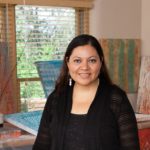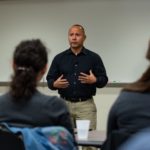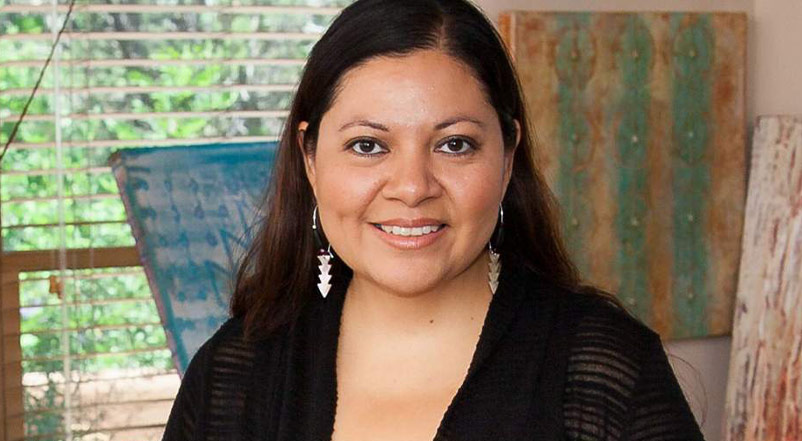Welcome to Making Meaning, a podcast that explores how and why the humanities are an essential part of our everyday lives. In this series, we hear stories from our nation’s humanities councils and leaders across the greater United States about the role the humanities have played during the pandemic and are playing in our recovery. Listen to the trailer in English and in Spanish translation. All episodes become available on Tuesday, November 9, 2021, wherever you receive your podcasts.
Ep. 6: Indigenous Communities and the Strength of Storytelling
Writer and visual artist Melissa Melero-Moose talks about fostering creativity during the pandemic on the Reno-Sparks Indian colony in Hungry Valley, NV. Eric Hemenway, director of the Department of Repatriation, Archives and Records for the Little Traverse Bay Bands of Odawa Indians, explains how storytelling can uncover misrepresentations about Native communities.
Guest Bios:
 Melissa Melero-Moose is a mixed-media visual artist, writer and curator. She is a Northern Paiute enrolled with the Fallon Paiute-Shoshone Tribe and lives with her family in Hungry Valley, Nevada. She is a professional artist, contributing writer for First American Art Magazine and founder/curator of the art collective the Great Basin Native Artists. Melissa holds a Bachelor of Fine Art from the Institute of American Indian Arts, Santa Fe, New Mexico and a Bachelor of Science from Portland State University, Oregon. She exhibits her art regionally and nationally and has won numerous awards and acknowledgement for her work. She has received artist fellowships and grants from the Joan Mitchell Foundation, New York, New York; Nevada Museum of Art, Reno, Nevada; School for Advanced Research, Southwest Association of Indian Arts, Wheelwright Museum, and the Institute of American Indian Arts, Santa Fe, New Mexico.
Melissa Melero-Moose is a mixed-media visual artist, writer and curator. She is a Northern Paiute enrolled with the Fallon Paiute-Shoshone Tribe and lives with her family in Hungry Valley, Nevada. She is a professional artist, contributing writer for First American Art Magazine and founder/curator of the art collective the Great Basin Native Artists. Melissa holds a Bachelor of Fine Art from the Institute of American Indian Arts, Santa Fe, New Mexico and a Bachelor of Science from Portland State University, Oregon. She exhibits her art regionally and nationally and has won numerous awards and acknowledgement for her work. She has received artist fellowships and grants from the Joan Mitchell Foundation, New York, New York; Nevada Museum of Art, Reno, Nevada; School for Advanced Research, Southwest Association of Indian Arts, Wheelwright Museum, and the Institute of American Indian Arts, Santa Fe, New Mexico.
Explore Melissa Melero-Moose’s work and find out more about the Great Basin Native Artists.
Her essay, “Thankfulness, Art, and the View from Above,” was part of Humanities Heart to Heart, a Nevada Humanities program.
 Eric Hemenway is an Anishnaabe/Odawa from Cross Village, Michigan. His mother is tribal citizen Peggy Hemenway. Eric is the Director of Repatriation, Archives and Records for the Little Traverse Bay Bands of Odawa Indians (LTBB). Eric oversees the management, collecting and preservation of historic documents and materials for the tribe. These materials are used to support LTBB government functions, its citizens and educational initiatives, such as; museum exhibits, media, curriculum, publications, historical interpretation, signage, web content and presentations. Collaborations on exhibits have included the National Park Service, state of Michigan, Mackinac State Historic Parks, Emmet County, Welt Museum Wien Vienna, Austria and the Harbor Springs History Museum, as well as other museums. Eric has also extensive work experience under the Native American Graves Protection and Repatriation Act. He currently sits on boards for the Michigan Historical Commission and Little Traverse Conservancy. Eric is a former board member of the Michigan Humanities Council, Michigan Historical Society, Emmet County Historical Commission, National NAGRPA Review Committee, Harbor Springs Historical Museum and the Michigan Commission on the Commemoration of the Bicentennial of the War of 1812.
Eric Hemenway is an Anishnaabe/Odawa from Cross Village, Michigan. His mother is tribal citizen Peggy Hemenway. Eric is the Director of Repatriation, Archives and Records for the Little Traverse Bay Bands of Odawa Indians (LTBB). Eric oversees the management, collecting and preservation of historic documents and materials for the tribe. These materials are used to support LTBB government functions, its citizens and educational initiatives, such as; museum exhibits, media, curriculum, publications, historical interpretation, signage, web content and presentations. Collaborations on exhibits have included the National Park Service, state of Michigan, Mackinac State Historic Parks, Emmet County, Welt Museum Wien Vienna, Austria and the Harbor Springs History Museum, as well as other museums. Eric has also extensive work experience under the Native American Graves Protection and Repatriation Act. He currently sits on boards for the Michigan Historical Commission and Little Traverse Conservancy. Eric is a former board member of the Michigan Humanities Council, Michigan Historical Society, Emmet County Historical Commission, National NAGRPA Review Committee, Harbor Springs Historical Museum and the Michigan Commission on the Commemoration of the Bicentennial of the War of 1812.
Learn more about the Little Traverse Bay Bands of Odawa Indians.
Statistics mentioned in this episode taken from:
CDC Risk for COVID-19, Hospitalization and Death by Race/Ethnicity
Voices featured at the top of the show: Trey Mitchell (misidentified in the episode as Matthew Gibson) (Virginia Humanities), Julia Wong (Immigrant History Initiative, “Talking Asian American Identity with Your Children: Racism, Parenting and Child Development during the Pandemic,” a Connecticut Humanities’-supported program), Jennifer Tonko (Minnesota Humanities Center), Samantha Anderson (Arizona Humanities), and Stephanie Gibson (Nevada Humanities).
Find out more about Native and Indigenous culture on our blog:
Haudenosaunee Women and 1,000 Years of Political Agency
A Conversation on Decolonization with Humanities Guåhan
Beyond Just Voting’: The Native Vote in Montana
Water Storytelling with Utah Humanities
Stories of CHamorro women with Northern Marianas Humanities Council
The show is produced by LWC. Elizabeth Nakano is our producer and sound designer. Jimmy Gutierrez edited the series. Jen Chien is executive editor. Cedric Wilson is lead producer. Spanish translations by Virginia Lora. You can find more episodes on Apple Podcasts, Spotify, or wherever you listen to your favorite podcasts.
Making Meaning is a podcast from the Federation of State Humanities Councils and is part of its “Humanities in American Life” initiative, which is generously funded by a grant from The Andrew W. Mellon Foundation.
Note: The opinions and ideas expressed in this episode are those of our guests and do not necessarily reflect those held by the Federation of State Humanities Councils or its funders.


